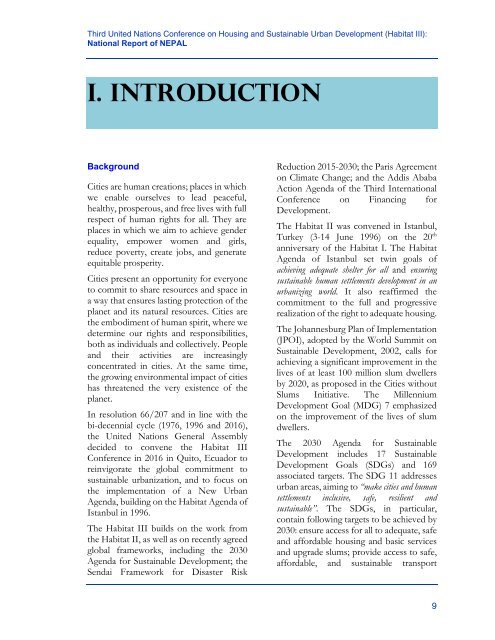Inclusive Cities Resilient Communities
Nepal-Habitat-III-National-Report
Nepal-Habitat-III-National-Report
You also want an ePaper? Increase the reach of your titles
YUMPU automatically turns print PDFs into web optimized ePapers that Google loves.
Third United Nations Conference on Housing and Sustainable Urban Development (Habitat III):<br />
National Report of NEPAL<br />
I. INTRODUCTION<br />
Background<br />
<strong>Cities</strong> are human creations; places in which<br />
we enable ourselves to lead peaceful,<br />
healthy, prosperous, and free lives with full<br />
respect of human rights for all. They are<br />
places in which we aim to achieve gender<br />
equality, empower women and girls,<br />
reduce poverty, create jobs, and generate<br />
equitable prosperity.<br />
<strong>Cities</strong> present an opportunity for everyone<br />
to commit to share resources and space in<br />
a way that ensures lasting protection of the<br />
planet and its natural resources. <strong>Cities</strong> are<br />
the embodiment of human spirit, where we<br />
determine our rights and responsibilities,<br />
both as individuals and collectively. People<br />
and their activities are increasingly<br />
concentrated in cities. At the same time,<br />
the growing environmental impact of cities<br />
has threatened the very existence of the<br />
planet.<br />
In resolution 66/207 and in line with the<br />
bi-decennial cycle (1976, 1996 and 2016),<br />
the United Nations General Assembly<br />
decided to convene the Habitat III<br />
Conference in 2016 in Quito, Ecuador to<br />
reinvigorate the global commitment to<br />
sustainable urbanization, and to focus on<br />
the implementation of a New Urban<br />
Agenda, building on the Habitat Agenda of<br />
Istanbul in 1996.<br />
The Habitat III builds on the work from<br />
the Habitat II, as well as on recently agreed<br />
global frameworks, including the 2030<br />
Agenda for Sustainable Development; the<br />
Sendai Framework for Disaster Risk<br />
Reduction 2015-2030; the Paris Agreement<br />
on Climate Change; and the Addis Ababa<br />
Action Agenda of the Third International<br />
Conference on Financing for<br />
Development.<br />
The Habitat II was convened in Istanbul,<br />
Turkey (3-14 June 1996) on the 20 th<br />
anniversary of the Habitat I. The Habitat<br />
Agenda of Istanbul set twin goals of<br />
achieving adequate shelter for all and ensuring<br />
sustainable human settlements development in an<br />
urbanizing world. It also reaffirmed the<br />
commitment to the full and progressive<br />
realization of the right to adequate housing.<br />
The Johannesburg Plan of Implementation<br />
(JPOI), adopted by the World Summit on<br />
Sustainable Development, 2002, calls for<br />
achieving a significant improvement in the<br />
lives of at least 100 million slum dwellers<br />
by 2020, as proposed in the <strong>Cities</strong> without<br />
Slums Initiative. The Millennium<br />
Development Goal (MDG) 7 emphasized<br />
on the improvement of the lives of slum<br />
dwellers.<br />
The 2030 Agenda for Sustainable<br />
Development includes 17 Sustainable<br />
Development Goals (SDGs) and 169<br />
associated targets. The SDG 11 addresses<br />
urban areas, aiming to “make cities and human<br />
settlements inclusive, safe, resilient and<br />
sustainable”. The SDGs, in particular,<br />
contain following targets to be achieved by<br />
2030: ensure access for all to adequate, safe<br />
and affordable housing and basic services<br />
and upgrade slums; provide access to safe,<br />
affordable, and sustainable transport<br />
9


